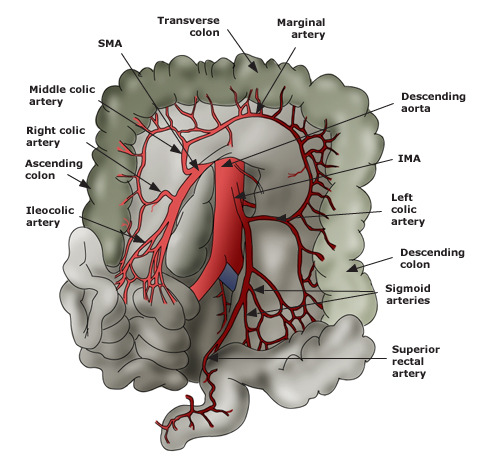What is Colitis?
Ischemia means a lack of blood flow. Blood flow to the intestines is crucial to deliver oxygen and nutrients and carry away waste products. There are several different things that can decrease blood flow such as: blockage of the blood vessel, narrowing of the vessel, or decreased blood available. The lack of blood supply can be very serious leading to tissue damage, death of tissue, widespread infection, and death.

Who gets it?
It is uncommon in the overall population and occurs most often in the elderly. Some risk factors include:
- Older than 60 years old
- Use of dialysis due to kidney disease
- High blood pressure
- Low levels of albumin (a protein) circulating in your blood
- Diabetes mellitus
- Use of certain medications
- Acute low blood pressure
Why does Colitis Happen?
In most people, the blood supply of the colon is set up in the same way. The large descending aorta carries blood down from the heart and several vessels break off from it. The ones that we are interested in when talking about the colon are the:
- Superior mesenteric artery - provides blood for the whole small intestine except the first portion. This vessel breaks into smaller branches that supply the right side and transverse portion of the colon.
- Inferior mesenteric artery - supplies the left side of the colon and top of the rectum
- Internal iliac artery - serves the rectum
Between these two larger vessels, the superior and inferior mesenteric artery, there is collateral supply, meaning that in some spots the vessels connect so that the blood supply is shared between the two. This is a safety tool because if one vessel would get plugged or blocked there can be blood coming from the other one to serve the same site. Despite this shared blood supply, there are two weak points where there is increased risk of decreased blood flow; only small branches of one vessel serve the splenic flexure and the rectosigmoid junction.
As discussed before, when there is a decrease in blood flow from various causes, this can impact the tissue of the colon. Most of the time a specific occlusion cannot be found.
What are the Symptoms?
The symptoms depend on how much colon does not have blood supply and for how long there has been decreased flow. Possible symptoms include:
- Rapid onset mild to severe abdominal pain, usually on the left side
- Mild to severe rectal bleeding ranging to bloody diarrhea within 24 hours of the onset of abdominal pain
The symptoms are a bit different than when the small bowel does not have enough blood. The
pain is less severe, felt to the side instead of around the bellybutton, and often there is blood
present in the stool.
How is it diagnosed?
- Blood work may be ordered looking for signs of tissue damage or elevation in the white blood cells
- Abdominal x-ray
- CT scan
- Colonoscopy
- Angiography: this is taking pictures of your blood vessels after injecting a special dye
- Surgery
Depending on the cause, further studies may be ordered. For example, if the lack of blood flow was due to a blood clot, there will be investigation into the cause of the increased clotting.
How is it Treated?
Treatment depends on the severity of the disease and the cause.
If there is no dead tissue with active infection or perforation (a hole in the colon), supportive care is used. This includes:
- IV fluids. You receive fluids through a needle in a vein. Fluids are necessary to make sure that the colon is getting enough blood flow.
- Bowel rest. You will also receive calories and nutrition through the IV.
- Any medication that can make the lack of blood supply worse will be held.
- Antibiotics may be given.
Surgery and removal of that part of the colon may be necessary if the tissue dies.
It is very rare for a blockage of a large vessel to be the cause of the decreased blood flow so cutting out a blood clot (embolectomy), bypass of that vessel (bypass graft), or cleaning the vessel (endarterectomy) are techniques rarely used.
Depending on the cause, further treatment may be necessary, for example, if you are at increased risk of blood clotting you may be put on blood thinners.
How long will I have problems?
If there is not a blockage in your blood vessel, most people improve within a day or two with total resolution on imaging studies within 1-2 weeks. If tissue died, things can be more serious and may require surgery. Also, the other health conditions that you had prior to developing the lack of blood flow are very important in predicting your recovery time.
Recurrence of this disorder is rare if the conditions that lead to it are treated or prevented. However, about 20% of patients develop chronic colitis from this injury to the colon.
For more information on Ischemic Colitis, call our gastroenterology offices at (715) 847-2558.
© Copyright 2012 GI Associates. S.C. All rights reserved.
